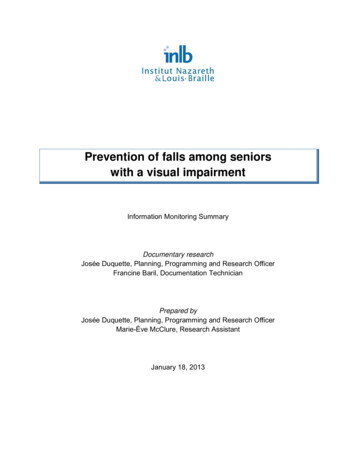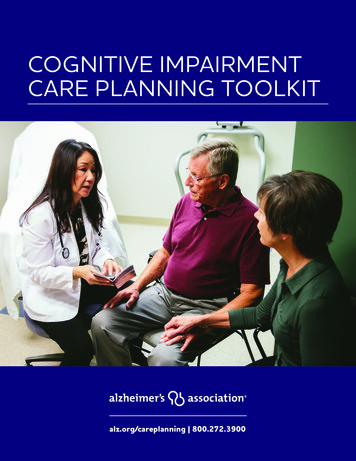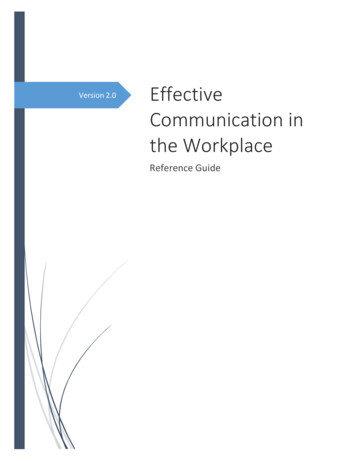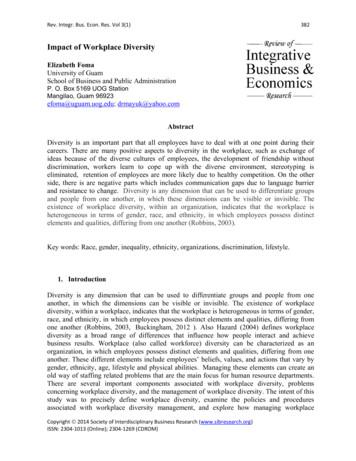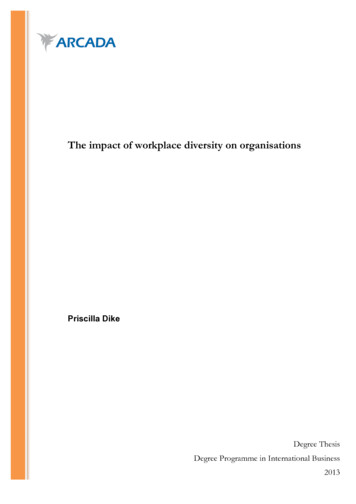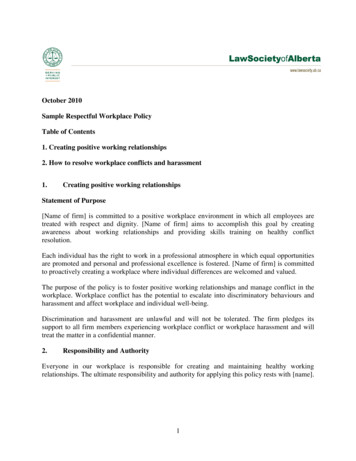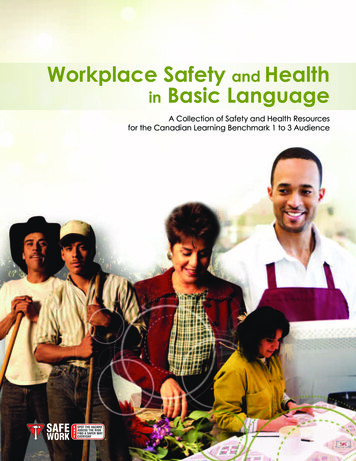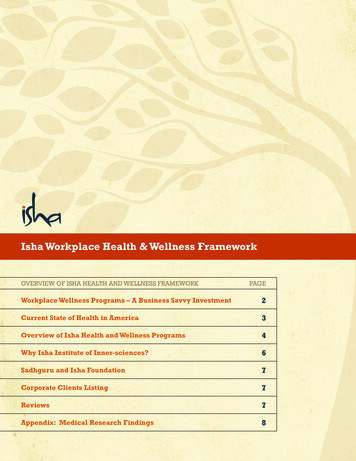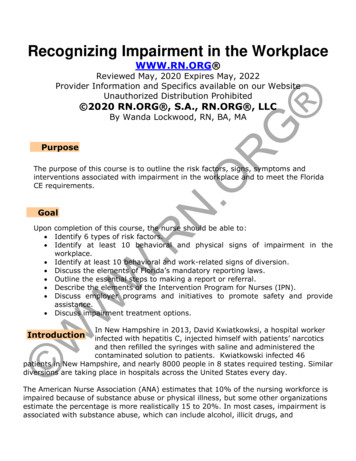
Transcription
Recognizing Impairment in the WorkplaceWWW.RN.ORG Reviewed May, 2020 Expires May, 2022Provider Information and Specifics available on our WebsiteUnauthorized Distribution Prohibited 2020 RN.ORG , S.A., RN.ORG , LLCBy Wanda Lockwood, RN, BA, MAPurposeThe purpose of this course is to outline the risk factors, signs, symptoms andinterventions associated with impairment in the workplace and to meet the FloridaCE requirements.GoalUpon completion of this course, the nurse should be able to: Identify 6 types of risk factors. Identify at least 10 behavioral and physical signs of impairment in theworkplace. Identify at least 10 behavioral and work-related signs of diversion. Discuss the elements of Florida’s mandatory reporting laws. Outline the essential steps to making a report or referral. Describe the elements of the Intervention Program for Nurses (IPN). Discuss employer programs and initiatives to promote safety and provideassistance. Discuss impairment treatment options.In New Hampshire in 2013, David Kwiatkowksi, a hospital workerinfected with hepatitis C, injected himself with patients’ narcoticsand then refilled the syringes with saline and administered thecontaminated solution to patients. Kwiatkowski infected 46patients in New Hampshire, and nearly 8000 people in 8 states required testing. Similardiversions are taking place in hospitals across the United States every day.IntroductionThe American Nurse Association (ANA) estimates that 10% of the nursing workforce isimpaired because of substance abuse or physical illness, but some other organizationsestimate the percentage is more realistically 15 to 20%. In most cases, impairment isassociated with substance abuse, which can include alcohol, illicit drugs, and
prescription drugs, although some impairment is related to psychological or physicalimpairment.According the National Survey on Drug Use and Health (NSDUH) over 21 millionAmerican adults had a substance abuse disorder in 2014 with 80% associated withalcohol and 1 out of 8 with both alcohol and drugs.Prescription drug abuse is especially a concern for healthcare workers, such as nurses,because they have easy access to medications through diversion of patientmedications. Prescription drugs that are frequently abused (and diverted) includeamphetamines, opioids, sedatives, tranquilizers, and inhalants.Risk factors for substance use disorderSome people are more vulnerable to substance use disorderthan other. While both drug and alcohol addiction appear tohave a genetic component (40 to 60% by some estimates),other factors may increase FamilyPhysicalRole-relatedExamplesDepression, anxiety, low self-esteem learning disabilities, mentalhealth disorders. People may attempt to self-medicate.Rebelliousness, violence, risk-taking behavior, academic problems,conduct disorder, aggressive behavior, response to social or peerpressure to drink/take drugs.Positive reinforcement to drinking/drug taking by family, friends.Hx of drug or alcohol use by parents or siblings, family traum,dysfunctional family.Chronic pain, chronic illness, physical disability.Burnout, lack of adequate support in the work environment, workoverload. Lateral violenceNurses have a higher risk of substance use disorder than the overall population. Nursesare more likely to seek help for physical complaints (insomnia, anxiety, depression)rather than substance abuse, which is the underlying problem. This allows thesubstance abuse to continue and may even result in prescriptions that exacerbate theaddiction.Signs of impairment and diversionNurses face much stress in their workfrom caring for difficult patients, dealing with life and death decisions, working long
shifts, working overtime, and rotating shifts. Some may have chronic pain, especiallylower back pain. The easy access to medications at work to reduce stress anddiscomfort can become a temptation, a “one-time” thing that escalates.Healthcare workers who are impaired rarely admit to impairment unless confronted,and many take extra precautions to avoid discovery, such as chewing gum or eatingbreath mints to disguise the smell of alcohol and claiming to have allergies to explainrunny nose and bloodshot eyes. Alcoholic nurses may drink at work, disguising thealcohol in soft drinks or coffee.Those who are impaired are often in denial about the extent of their impairment andmay believe that it is “under control” even though it is severely impacting theirpersonal and professional lives. Impaired nurses are unlikely to voluntarily report theirsubstance abuse because, in most cases, doing so results in temporary or permanentloss of employment and, in some cases, loss of insurance that might cover the costs ofrehabilitation. Admitting to substance abuse, especially if it involves diversion, may insome states result in loss of nursing license or restrictions to the nursing license (suchas restrictions on administering medications).The ABCDEs of addiction include: A: The inability to Abstain. B: Impairment in Behavioral control. C: Craving for drugs or rewarding experience. D: Diminished recognition of significant problems with behavior/personalrelationships. E: Dysfunctional Emotional response.Behavioral signs of impairment Personality changes, mood swings. Underperforms and makes excuses. Frequent absences and late arrivals. Shows resentment of authority. Wears long sleeves even whentemperature is high. Appears visibly intoxicated, high. Reeks of alcohol or marijuana. Fails to keep appointments or meetdeadlines. Makes increasing numbers of errors. Takes longer to carry out tasks. Has increasing difficulty getting alongwith family and coworkers. Refuses drug testing. Has intense bursts of energy.Physical signs Chronic rhinorrhea. Track marks. Bloodshot eyes. Poor hygiene. Weight loss or weight gain. Slurred or unclear speech. Hand tremors, musclefasciculations. Excessive drowsiness. Rapid speech. Sallow skin color. Frequent diarrhea. Dilated or constricted pupils. Frequent nosebleeds. Insomnia. Confusion, memory loss
Has increasing absences and vaguehealth complaints. TremorsOne problem with impaired nurses is that nurses who lose employment for impairmentor diversion in one state and are not subjected to disciplinary action or adequatelytreated for addiction often go on to work in other hospitals or states and continue withthe same behavior.For example, according to an NBC2 report, a nurse was accused of diverting 686bottles of fentanyl and 476 bottles of midazolam while working in Colorado in 2015.She lost her job in February but by March 2015 was working in Florida and obtained aFlorida nursing license by May after which she lost two more positions for divertingdrugs. There is no national registry for impaired healthcare workers.Nurses who abuse illegal opioids (such as heroin or cocaine) or prescription opioids(such as morphine, oxycodone, or fentanyl) almost always resort to diversion to feedtheir addiction even though, when confronted, they frequently deny doing so out ofshame and/or concern about legal actions against them since stealing drugs is a felony.Studies indicate that the typical impaired nurses’ substance of choice includes bothalcohol and drugs, but nurses are more likely to be addicted to prescription drugs thanstreet drugs because they have access to prescription drugs through diversion.Common methods of diversion include: Using waste narcotics for personal use. Failing to dose the patient properly and stealing part of the dose. Removing excessive amounts of PRN medications for personal use. Tampering with patients’ drugs, such as replacing injection with saline andoral tablets with NSAID.Behavioral signs of diversion Administers more narcotic drugsthan other nurses. Volunteers to administer drugsto others’ patients. Comes to work early, stays late,volunteers for overtime. Takes frequent bathroombreaks. Reports wasting excessiveamounts of drugs. Carries drugs, syringes inpockets.Workplace signs Narcotics records do not reconcile. Patients do not appear to have relieffrom pain medication. Drug choice and/or dosage isinappropriate for patient’s level of pain. Medications missing. Medication tampering (broken vials). Improper storage of injection supplies. Excessive time spent near drug supply. Frequent administration of PRNmedications. Failure to document waste.
Increasing personal/professionalisolation. Fentanyl patches show tampering ordisappear.Mandatory reporting lawsWhile mandatory reporting laws may varysomewhat from one state to another, virtually all require that nurses who are impairedand/or diverting drugs be reported to the appropriate authorities. Additionally, theAmerican Nurse Association (ANA) requires reporting impaired nurses as an ethicalobligation.In the state of Florida, mandatory reporting is governed byStatute 464.018 (1K) (2012), which states clearly that failing toreport impairment places the person’s own license in jeopardy:Florida statutes: The following acts constitute grounds for denial of a license of disciplinary actionas specified in 456.072 (2) and 464.0095 (Nurse Licensure Compact):o Failing to report to the department any person who the nurseknows is in violation of this part or of the rules (see below) of thedepartment or the board; however, if the nurse verifies that suchperson is actively participating in a board-approved program for thetreatment of a physical or mental condition, the nurse is required toreport such person only to an impaired professionals consultant. Statute 456.072 includes:o Being unable to practice with reasonable skill and safety to patients byreason of illness or use of alcohol, drugs, narcotics, chemicals, or any othertype of material or as a result of any mental or physical conditiono Testing positive for any drug, as defined in s. 112.0455, on any confirmedpre-employment or employer-ordered drug screening when the practitionerdoes not have a lawful prescription and legitimate medical reason for usingthe drug.o Being terminated from a treatment program for impaired practitioners,which is overseen by an impaired practitioner consultant . . . for failure tocomply, without good cause, with the terms of the monitoring or treatmentcontract entered into by the licensee, or for not successfully completing anydrug treatment or alcohol treatment program. Statute 112.0455 defines “drug” as alcohol, including distilled spirits, wine, maltbeverages, and intoxicating liquors; amphetamines; cannabinoids; cocaine;phencyclidine (PCP); hallucinogens; methaqualone; opiates; barbiturates;benzodiazepines; synthetic narcotics; designer drugs; or a metabolite of any ofthe substances listed herein.
Confronting and ReportingDespite mandatory reporting requirements, nurses are often very reluctant to reportothers even when confronted with clear evidence, but this reluctance can endangerpatients and the person who is impaired. In Florida, reports must be made to one orboth of the following: Florida Department of Health (DOH): This is the disciplinary referral andresults in an investigation by the Board of Nursing, but action may be delayed formonths while investigation is carried out (1-850-245-4444). A complaint can befiled online: https://www.flhealthcomplaint.gov/ The Board of Nursing actionsmay include a fine, reprimand or revocation of license, or referral to the IPN forevaluation and treatment. Intervention Program for Nurses (IPN) (1-800-840-2720): This adjunct tothe Board of Nursing is the alternative to disciplinary action and initial actionusually occurs within 1 to 3 days.The American Nurses Association (ANA) recommends that colleagues confront impairednurses directly before reporting to a higher authority, such as to a supervisor ordirectly to the DOH or IPN, allowing the person the opportunity to self-report. However,studies show many nurses fail to confront or report for a variety of reasons: Fear of incorrect assessment of the impairment. Fear of retaliation and repercussions, including physical attacks. Concern that the report will not be taken seriously. Concern about disloyalty (tattle-tale). Concern about jeopardizing another’s employment. Belief that a supervisor will know the situation and report. Fear of being sued.Rather than confronting, co-workers often enable impaired workers by covering uperrors, making excuses, and increasing their own workload. Co-workers may try to“rescue” an impaired nurse through personal support and counseling, but this is rarelyeffective and is not appropriate. Typically, by the time a nurse’s addiction manifests inthe workplace, the problem is severe and has already impacted other aspects of theperson’s health, family, and social life. So, what may appear to be a small one-timeproblem (coming to work smelling of alcohol) may, in fact, be the sign of a seriouschronic addiction.When considering confronting and/or reporting a colleague, it’s important to think ofaddiction as a disease and not a moral failing. Confronting and reporting a nurse who isimpaired may be the greatest act of kindness in the long run, saving the nurse’s careerand life. If the reporting nurse feels any concern for personal safety, the nurse
should not confront the impaired person directly or alone but should reportthe concerns to a supervisor.Plan of action Observe and document: Often a nurse becomes concerned after a series ofobservations but has no clear evidence of impairment and is reluctant to file areport that may be incorrect. In this case, the nurse should begin to observeclosely and to carefully document questionable behavior, including date, time,witnesses, description of behavior, and any action taken, avoiding subjectivestatements. Share concerns: The nurse may share observations and concerns with a seniorcolleague and/or a supervisor so that they can evaluate the situation anddetermine how to proceed. Confront/Intervene: The nurse should address concerns directly withoutaccusing or diagnosing but should not expect that the impaired nurse will admitto a problem. The nurse may provide the impaired nurse with a brochure aboutany employment assistance program that is available:o “I’m concerned about you. This is what I’ve observed: You have come towork late 3 times this week, your eyes are bloodshot, your nose is runningconstantly, and you dozed off at the desk this afternoon.” Report: This is the difficult step, but it is the most important:o If the impaired nurse was directly confronted, the impaired nurse will oftenimplore the other nurse not to report or will emphatically deny that aproblem exists, so the nurse must remain firm and sympathetic: “I feel thatI need to discuss these observations with the supervisor, and I can talk tothe person myself now or you can do that first if you want.”o If reporting directly to a supervisor: The nurse should review anydocumentation and be prepared to provide objective evidence: “I’mconcerned about nurse X. This is what I’ve observed.Note that many workplaces now have protocols in place for intervening and/orreporting, and if this if the case, the nurse should follow that protocol. If a nurse isobviously impaired at work (drunk, disoriented, unstable, altered mental status,smelling of alcohol), then emergent action is required, and the nurse who observes thisimpairment should immediately contact a supervisor and prevent the nurse fromcontact with patients. If necessary, the impaired nurse should be transported to theemergency department for treatment (such as for an overdose). Self-report: For those who recognize that they have a problem or fear that theywill be reported, it is always better to self-report than to be reported by others
because admitting to a problem is the first step in recovery. The nurse shouldcontact the IPN directly and begin the process of enrolling.Intervention Program for NursesThe Intervention Program for Nurses, first established in 1983 and authorized byFlorida state legislation, is a program that is considered a national model and isdesigned to protect the public health and safety while offering assistance and earlyintervention to nurses who cannot safely practice because of substance abuse orphysical or psychological/psychiatric conditions. The Florida Department of Healthcontracts with IPN to provide services to nurses. IPN is funded through the Board ofNursing license renewal fees.IPN provides an alternative to disciplinary action by the Board of Nursing. Participationis voluntary although some nurses are referred to IPN for evaluation, and participationis mandated if they are to retain their licenses. Most nurses participate as analternative to disciplinary action.Steps in IPN: Telephone: Once a referral is made to the IPN, the nurse must telephone theprogram: 1-800-840-2720. This initiates the process. Paperwork: A screening form and various waivers and releases must be signedto allow evaluators to obtain records and to communicate with employers andfacilities and the Board of Nursing about the nurse’s progress. Refrain from practice: The nurse cannot practice until the evaluator determinesfitness to practice, which is evaluated on an ongoing basis. Evaluation: The nurse receives a list of approved providers and may choose anevaluator who determines whether the nurse is appropriate for IPN monitoringand whether the person needs treatment. If treatment is recommended the IPNwill assist the nurse with treatment options. Monitoring agreement: Treatment is outlined in this agreement that usuallycovers a 2- to 5-year period. Treatment is individualized and based on referral,evaluation, and IPN requirements. Nurses usually receive a restriction onadministering narcotics for at least a year.After receiving the monitoring agreement, the nurse is assigned a case manager andmust undergo random toxicology screening and may attend a nurse support group(over 150 are available throughout the state). The case manager notifies the nursewhen the person is validated to resume nursing practice although the nurse may haveto abide by some restrictions. The following may be required: Inpatient drug or alcohol treatment. Weekly counseling meetings. Regular psychiatric visits. Random urine drug testing.
Mandatory check-in calls Monday through Friday.Mandatory notification of employers of IPN status.Restrictions on all alcohol intake.Restrictions on taking medications without prior IPN approval.Restriction on any use of specific medications.Possible loss of narcotic-administration privileges.Possible loss of prescription medication administration privileges.Possible requirement for working under supervision.Restrictions on working environment (home health, hospice).Requirement for workplace performance monitoring.Restriction on multiple jobs and overtime work.Fitness to work is determined by the nurses stability, support systems available,problem-solving ability and judgment, cognitive status, coping ability, and decisionmaking ability as well as completing requirements outlined in the monitoringagreement.IPN provides referrals and support groups and relapse prevention groups to help theimpaired nurse to stay free of drugs or alcohol but is not itself a treatment program.Rather, it refers the nurse for treatment. If the nurse does not progress, discontinuestreatment, or fails to comply with the program, this information is sent to theDepartment of Health so it can take action to remove the nurse’s license. The impairednurse does incur significant costs because the treatment and drug testing is not free.Employer initiativesThe most common method of dealing with impairednurses for many years has been to fire them or report them to the Board of Nursing fordisciplinary action. However, this often just passes the impaired nurse on to employersin other facilities or states. In some cases, nurses are crim
Physical Chronic pain, chronic illness, physical disability. Role-related Burnout, lack of adequate support in the work environment, work overload. Lateral violence Nurses have a higher risk of substance use disorder than the overall population. Nurses are more likely to seek hel

